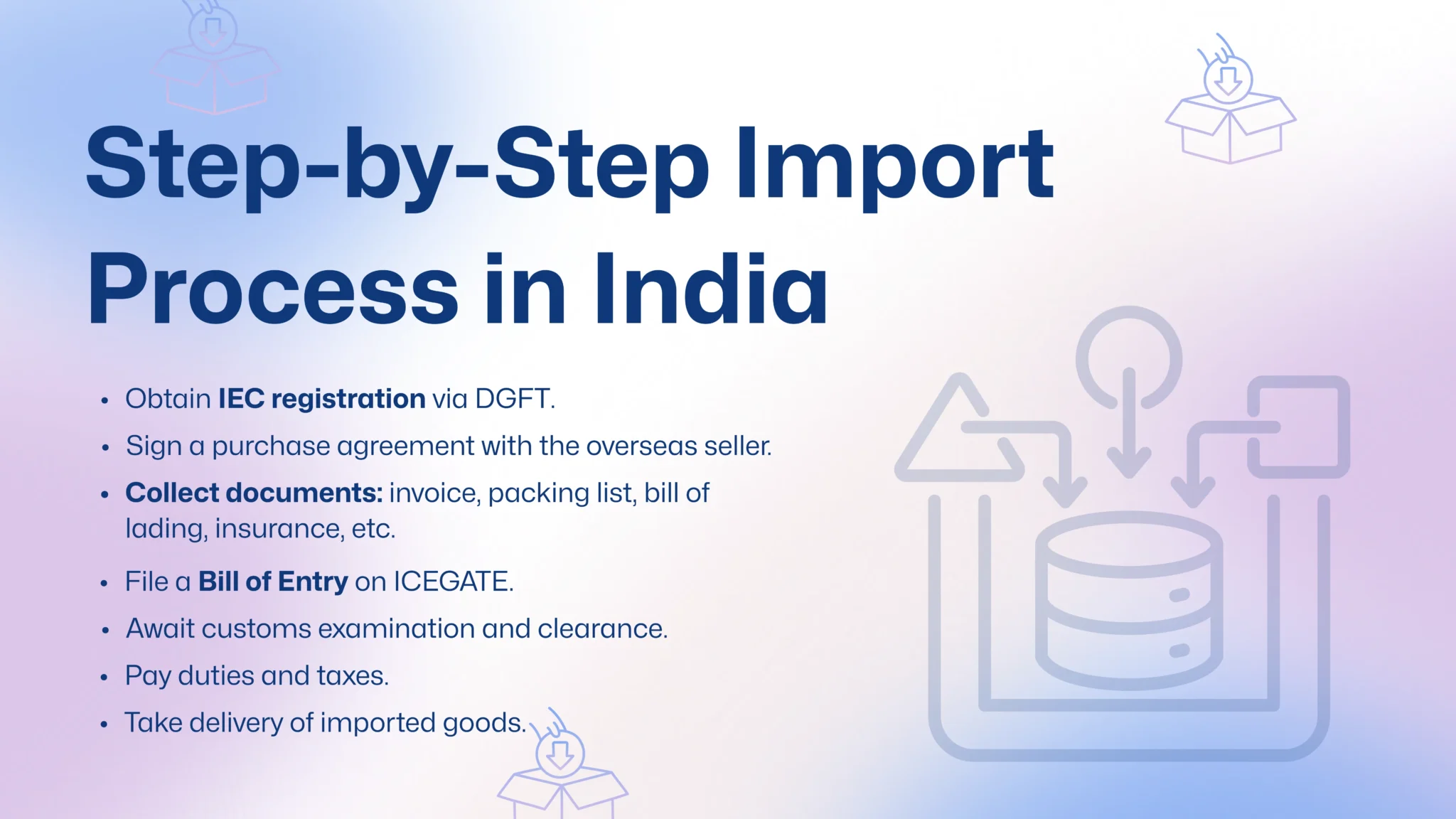India has firmly established itself as a major player in international trade. In the fiscal year 2023тАУ24, the nation’s merchandise trade exceeded USD 1.7 trillion, with imports alone accounting for over USD 677 billion. Whether you’re a new entrepreneur, seasoned importer, or growing exporter, understanding India’s customs duties and tax system is crucial for cost control, regulatory compliance, and seamless cross-border operations.
This detailed yet easy-to-understand guide will help you navigate India’s customs and trade tax system, empowering you to make informed decisions and build a resilient, compliant import-export business.
What You’ll Learn in This Blog
тЧП Meaning and Significance of Customs Duty
тЧП Key government bodies managing foreign trade
тЧП Overview of the primary customs duties in India
тЧП GST structure on imports and exports
тЧП How customs duties are calculated
тЧП Step-by-step import and export procedures
тЧП Restricted and banned goods
тЧП Concession schemes and tax exemptions
тЧП Impact of Free Trade Agreements (FTAs)
тЧП Penalties for non-compliance
тЧП Latest regulatory changes
тЧП Trusted online platforms for traders
тЧП Final insights on growing your business compliantly
What is Customs Duty?
Customs duty is an indirect tax levied by the Government of India on goods imported into or exported out of the country. It serves multiple purposes:
тЧП Regulates the flow of international goods
тЧП Encourages domestic manufacturing by making imports more expensive
тЧП Contributes to government revenue
Several factors determine the customs duty amount:
тЧП Type of product
тЧП Country of origin
тЧП Declared value of goods
тЧП Applicable trade agreements
Typically, customs duty is calculated based on the CIF (Cost, Insurance, and Freight) value of goods.
[cta_section index=”0″]
Key Government Authorities in International Trade
1. Central Board of Indirect Taxes and Customs (CBIC)
CBIC is the apex body governing indirect taxation, including customs and GST. It formulates policies, oversees duty collections, and ensures secure and efficient international trade procedures.
In FY 2022тАУ23, the CBIC collected тВ╣2.2 lakh crore in customs duties.
2. Directorate General of Foreign Trade (DGFT)
DGFT operates under the Ministry of Commerce and is responsible for implementing IndiaтАЩs foreign trade policy. It issues Importer Exporter Codes (IEC), regulates trade policies, and administers export incentive schemes.
As of 2024, over 6.5 lakh IECs are registered across India.
Major Types of Customs Duties in India
1. Basic Customs Duty (BCD)
BCD is the foundational import duty imposed under the Customs Tariff Act, 1975. Rates differ based on product category and the country of import.
For example, in the Union Budget 2024тАУ25, the government revised BCD on mobile phone components to encourage local manufacturing.
2. Countervailing Duty (CVD)
CVD ensures level competition by countering the excise duty that Indian manufacturers pay. This is applied to imported goods to balance pricing.
3. Anti-Dumping Duty
India has launched more than 300 anti-dumping investigations in the past decade, primarily against goods from China, Korea, and the EU. These duties protect Indian industries from unfair pricing and import dumping practices.
4. Protective Duty
When domestic industries are at risk from international competition, a temporary protective duty may be imposed to give them time to grow.
5. Safeguard Duty
Used as a temporary measure, safeguard duty is applied when a sudden rise in imports threatens to harm domestic producers.
GST on Imports and Exports
IGST on Imports
Imported goods attract Integrated GST (IGST) in addition to BCD and other duties. This helps maintain tax neutrality between imported and locally produced goods.
In 2023 alone, IGST on imports added тВ╣4.9 lakh crore to the government’s GST revenue. Registered businesses can claim Input Tax Credit (ITC) on this IGST, reducing their overall tax burden.
GST Refund Mechanism for Exporters
Exports are zero-rated under GST law, giving exporters two refund options:
тЧП Export on payment of IGST and claim refund, or
тЧП Export under LUT without payment of tax and claim a refund
According to the CBIC, exporters received тВ╣1.8 lakh crore in GST refunds in FY 2023тАУ24тАФa significant boost to their cash flows.
[read_our_article index=”2″]
Valuation and Calculation of Customs Duty and IGST
Customs duty is calculated based on the assessable value, usually the CIF value. Duties IGST applied sequentially.
Example Calculation:
тЧП CIF Value = тВ╣8,00,000
тЧП BCD @10% = тВ╣80,000
тЧП Subtotal = тВ╣8,80,000
тЧП IGST @18% = тВ╣1,58,400
тЧП Total Landed Cost = тВ╣10,38,400
Accurate valuation helps prevent underpayment or overpayment of taxes and avoids penalties.

Each step must be completed precisely to avoid delays or non-compliance issues.
Export Compliance Process
- Register for an IEC.
- Submit the Shipping Bill online.
- Package goods as per international standards.
- Arrange transport and logistics.
- Obtain clearance from customs at the port of export.
- Submit a Bank Realisation Certificate (BRC) to claim incentives.
Proper documentation and real-time tracking ensure fast, compliant exports.
[read_our_article index=”0″]
Restricted vs. Prohibited Goods
тЧП Restricted Goods:┬аRequire licenses or special approvals before import/export (e.g., specific chemicals, arms, endangered species).
тЧП Prohibited Goods:┬аNot allowed under any circumstance (e.g., narcotics, counterfeit items, certain wildlife).
As per IndiaтАЩs 2023 Export-Import Policy, over 400 product categories fall under restricted or controlled lists.
Duty Exemptions and Concessionary Schemes
Businesses may qualify for the following benefits:
тЧП Export Promotion Capital Goods (EPCG) Scheme:┬аImport machinery at reduced or zero duty for export-oriented production.
тЧП Advance Authorization Scheme:┬аDuty-free import of inputs used for manufacturing export products.
тЧП Special Exemptions:┬аFor educational, research, or diplomatic imports.
тЧП SEZs and EOUs:┬аOver 270 SEZs across India (as of March 2024) offer tax holidays and duty waivers to exporters.
Utilising these schemes effectively can significantly reduce costs and enhance competitiveness.
How Free Trade Agreements (FTAs) Help
India has signed FTAs with ASEAN, Japan, South Korea, and other nations. These agreements permit reduced or zero customs duties on specific goods, provided the Rules of Origin are fulfilled.
To claim FTA benefits, businesses must provide a valid Certificate of Origin (CoO).
Notably, India’s FTA with the UAE, signed in 2023, led to a 19% surge in bilateral trade, highlighting the immense opportunity to leverage such agreements.
Consequences of Non-Compliance
Ignoring customs rules and procedures can result in:
тЧП Heavy fines
тЧП Confiscation of goods
тЧП Suspension or cancellation of IEC
тЧП Legal proceedings
CBIC reported over 9,200 customs-related violations in FY 2022тАУ23. Even a minor mistake in documentation or valuation can result in severe penalties.
Recent Regulatory Developments
тЧП Increased import duties on luxury items and electronics to support local production
тЧП Introduction of Faceless Assessment for Faster Customs Clearance
тЧП Greater integration with digital platforms like ICEGATE, SWIFT, and E-Sanchit
тЧП Trade policies aligned with Make in India and PLI schemes.
These steps demonstrate India’s commitment to enhancing the ease of doing business while fostering domestic growth.
Helpful Online Platforms for Traders
тЧП ICEGATE:┬аwww.icegate.gov.in тАУ Customs filing & shipment tracking
тЧП CBIC:┬аwww.cbic.gov.in тАУ Tax updates & circulars
тЧП DGFT:┬аwww.dgft.gov.in тАУ IEC registration & policy updates
тЧП Indian Trade Portal:┬аwww.indiantradeportal.in тАУ FTAs & tariff info
[read_our_article index=”1″]
Conclusion: Trade with Confidence and Compliance
International trade involves multiple regulations, taxes, and proceduresтАФbut with the right guidance, it becomes manageable. By understanding how customs duties work, accurately calculating taxes, and leveraging trade agreements, your business can operate more efficiently and expand with confidence.
It’s essential to be clear, correct, and compliant at every step.
That’s where FinGuru India can support you. We simplify legal and compliance processesтАФso you can focus on growing your business, while we handle the paperwork and procedures.
Book a Consultation┬аwith Our Expert!
ЁЯУЮ Call Us:┬а+91-9999127022
ЁЯМР Visit:┬аwww.Finguruindia.com


